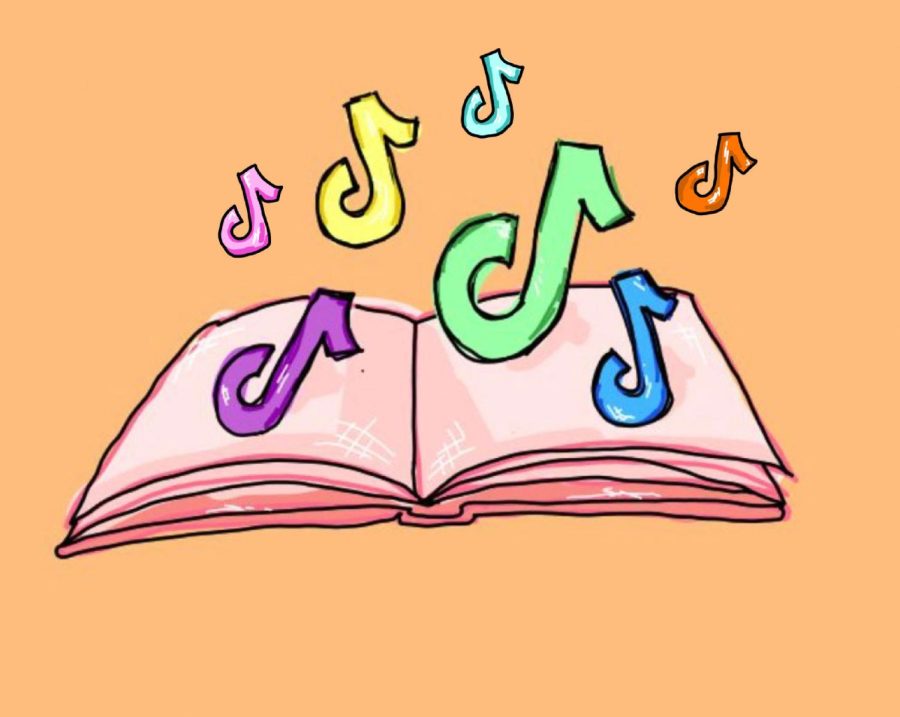There are Few Reasons to #BookTok
October 12, 2022
Last year, desperate to find a book to get myself out of a reading slump, I opened TikTok in search of book recommendations. As I scrolled through a myriad of videos on my search page, I encountered a video of a girl’s “5-star rated” books, which included the hashtag “BookTok.” Although none of the recommendations initially intrigued me, a couple of weeks later, I spotted a book on my friend’s shelf that was mentioned in the video. I picked it up, flipped to a page right in the middle and began to read. The writing was so excruciatingly bad, I did not know whether it would be more appropriate to laugh or to cry. Rest assured, that was my first and last intentional interaction with BookTok. I write this to you in full disclosure: BookTok is a warped creation, luring you in with what seems to be a good recommendation, when in reality you are left traumatized and apprehensive about the next review that is to come.
Currently, the hashtag BookTok has over 80 billion views and is filled with book reviews and recommendations that strive to promote TikTok’s standards of diversity and creativity among its viewers. For such values, BookTok fails to meet the criteria. BookTok, or at least its reviews, tend to revolve around the same contemporary romance genre. Most of the recommended books follow the same plots, start to finish, and tend to feature white, straight couple leads. No diversity? No flavor? No good.
Additionally, the male leads in half of these books are abusive, yet this is often overlooked because “he stared at me from across the room with his striking green orbs.” It’s difficult to establish whether the purpose of the male lead is to allure readers with his looks or his personality, which seems absurd considering his predominant trait is abusive manipulation. Concerningly enough, this method works for the young-adult audience of BookTok.
Who are the individuals recommending and influencing a whole demographic on TikTok, you might ask? Half of the time, it’s a half-literate 13-year-old who only picked up a book because there’s precisely two pages of smut included. You don’t have to be The New York Times Book Review to give a recommendation. But, the central issue is that these reviews, as well as the books they recommend, are deceiving because they are either so vague or so far from the truth that you find yourself wondering if you even read the same book. They don’t cover any reason for the book’s prowess, other than saying “this book is amazing, you must read it in your lifetime.” A good review should summarize the book, not spoil it, explain the effect it had on the person recommending it and go into some detail about the author’s writing style.
Some unfortunate individuals have fallen victim to BookTok’s deceptions.
“I try not to be someone who succumbs to a BookTok recommendation,” sophomore Willa Browne said. “However, over quarantine I pressed order on ‘It Ends With Us.’ Lo and behold, five pages in I decided that Colleen Hoover’s writing style was that of a 12-year-old girl’s.”
“As human beings, we really love to be influenced,” Browne added. “I think a harmful thing about BookTok is it really just contributes to the buying of books, rather than the actual reading of them.”
BookTok not only recommends books, but encourages the trendy academia aesthetic, which is extremely apparent. If I see one more Rory Gilmore-wannabe holding “They Both Die in the End,” I am going to make that ending very soon for them. When books become an aesthetic rather than an experience of obtaining knowledge, culture or pure enjoyment, then their purpose is defeated. A book does not have to be top tier or groundbreaking to be enjoyed, either. I personally take simple pleasure in an easy read that is merely for my entertainment and nothing else. I do not always resonate with the book, which is completely fine, but I draw the line when a book is bought for the sole purpose of acting as an accessory.
Of course, there are always outliers. “The Seven Husbands of Evelyn Hugo” by Taylor Jenkins Reid, which I initially heard about from BookTok, is one of my top reads from last year. Other great books that I have heard mentioned on BookTok are “Normal People,” “The Invisible Life of Addie LaRue” and “My Year of Rest and Relaxation,” all of which I have been compelled to buy. It is unfortunate that such quality novels get mixed among the jumble of half-decent books.
Others claim BookTok has a beneficial purpose other than contributing to the reading aesthetic. Sophomore Helena Mack explained why she has an appreciation for TikTok recommendations.
“My favorite thing [about BookTok] are the recommendations based on other books that I’ve already read,” she said. “If I read a book and want to read something that’s similar, I can get a recommendation.”
Although most BookTok recommendations consist of carbon-copy books written by love-dried millennials, TikTok does use an algorithm. Its “For You” page will show you videos based on similar ones that you have viewed, liked and saved, especially if you search for a certain hashtag. While it is possible to discover books that you are likely to enjoy on BookTok, this is only a small fraction of the app’s territory.
Alas, I would not count on BookTok as my go-to source for book recommendations. Try your local bookstore, “Goodreads” or even Obama’s recommended reading list if you are looking for a new novel. Believe me, you do not want to become the next victim of an unreliable review that leaves you scandalized.













